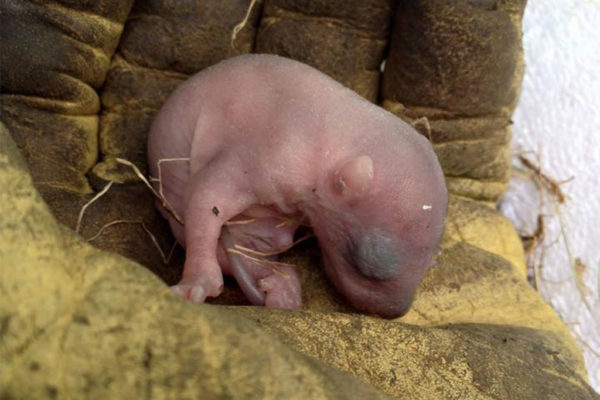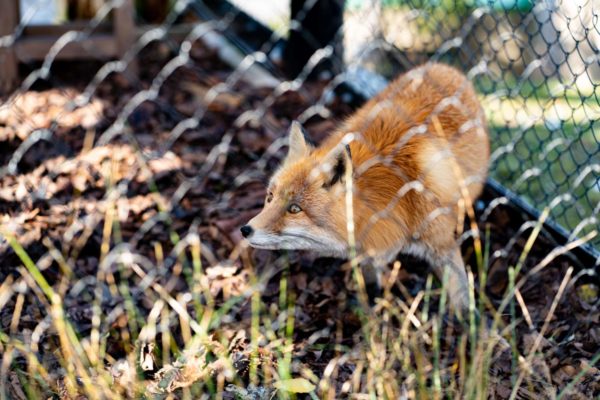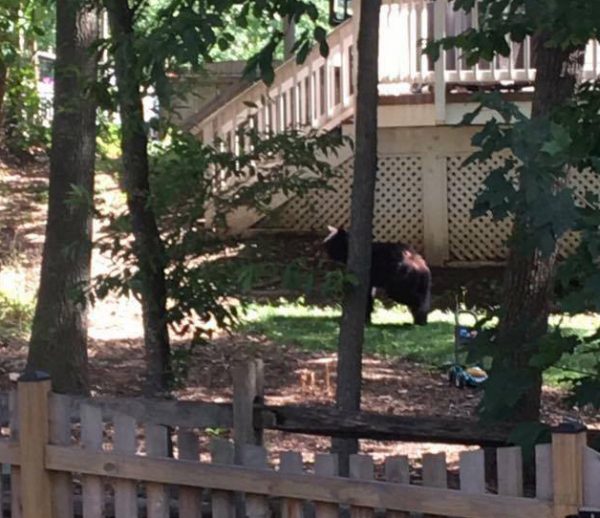
Herndon Man Pleads Guilty in 2011 Reston Shooting — Herndon resident Saul Pacheco Mejia pleaded guilty in federal court yesterday (Thursday) for his involvement in a 2011 drug deal where his associates shot and killed one of the buyers. Mejia was indicted in 2015 and could face up to 25 years in prison when sentenced on Nov. 11. [The Washington Post]
Man Arrested for Reston Stabbing — A 23-year-old has been charged with malicious wounding for a stabbing that was reported in the 2100 block of Cartwright Place around 10:03 p.m. Wednesday night (July 14). Police say they located the suspect at 10:57 p.m. that night after an extensive search of the area involving dogs and helicopters. [Patch]
Hawk Crashes into Reston Home — A loud crash at a window of Reston resident Edward Abbott’s home last Friday (July 9) led to the discovery of “a dead chipmunk and a stunned hawk lying on the deck.” A Fairfax County Animal Control officer who responded to the call took the bird to a veterinarian for examination, but they were unable to determine whether the hawk had killed the chipmunk. [Patch]
Reston Community Center Unveils Fall Offerings — RCC’s 2021 Fall Program Guide is now online. Registration will begin on Aug. 1 for Reston residents and employees and Aug. 8 for other individuals. A print guide will be delivered soon, but it will be condensed to just key information as the center looks to reduce its use of paper and carbon footprint. [RCC]

A sick bald eagle. A lost fawn. A rogue alligator in Reston. Who are you going to call? Fairfax County’s Animal Protection Police.
Made up of more than 25 specially-trained law enforcement officers within the Fairfax County Police Department, the APP’s responsibility is to enforce ordinances and to help protect humans and animals alike.
While they do assist in domestic animal situations, in recent years, they’ve received more and more calls for sick and distressed wildlife, Sgt. Daniel Cook says.
A 20-year veteran of the force, he believes this has to do with the ever-growing human population in the county.
“The population here, the housing market, the number of homes being constructed, it’s all steadily increasing,” Cook says. “So, there’s more and more people here. There’s going to be more and more interaction with wildlife.”
Cook says that calls have increased a little more than he anticipated in the last year, during the COVID-19 pandemic. This is related, he thinks, to folks being outside more, enjoying and observing nature.
“There are more people out in the parks. There’s more people around, looking,” Cook said.
Spring is always a busy time of year for the Animal Protection Police, since it is breeding season for many creatures.
“We get a lot of baby calls. A lot of baby raccoons, baby foxes, squirrels, birds, rabbits. You name it, we get ’em,” Cook said.
He says, for the most part, when they get calls about baby animals, there’s nothing wrong. For example, fawns are often left in one particular spot for hours by their parents.
“The first thing that goes through a lot of people’s minds is that [the animal] has been abandoned,” he says. “In reality, it has not.”
Cook says that humans should observe at a distance and refrain from touching the animals.
“We really don’t want people…handling the wildlife themselves,” he said.
If there’s something really wrong, as in cases where the animal is injured or sick, the APP will come out.
In those cases, many animals end up with licensed rehabilitators or veterinarians, who will help them heal and, hopefully, get released back into the wild.
From time to time, the APP does get some rather atypical calls.
In December 2019, they got a call about a bald eagle that turned out to be sick from lead poisoning, likely from eating fish with high levels of lead in them.
The eagle was rehabilitated and released back into the wild.
There was also Lord Fairfax, a 65-pound snapping turtle found in the county’s Alexandria area, and a rogue alligator, both one-time illegal pets that folks didn’t want any more.
“I think it was a year, maybe two years ago, we had an alligator up in Reston that somebody released into one of the lakes,” Cook said. “I think a citizen actually caught that, if I’m remembering correctly.”
Alligators and other exotic animals are illegal without proper licenses both in Fairfax County and Virginia.
Cook has pretty simple advice for anyone who spots any animal that they think might be in distress: “Number one, leave the wildlife alone. Keep an eye on it…and give us a call.”
The Animal Protection Police can be reached at FCPD’s non-emergency phone number, 703-691-2131.

County health officials are cautioning residents about a rabies alert in Reston.
A red fox that was captured on Monday (April 20) tested positive for rabies.
Anyone who may have been touched or bitten by this an adult red fox should call the county’s rabies program at 703-246-2433, extension 711. To report pets that may have come into contact with the animal, residents should call Fairfax County Animal Protection Police at 703-691-2131, extension 711.
Precautionary steps to avoid rabies include not allowing pets to roam unattended and ensuring pets are vaccinated against rabies annually.
The animal captured near North Shore Drive and Wiehle Avenue.
Rabies is a fatal but preventable viral disease that infects the central nervous system. It is transmitted through direct contact with saliva or nervous system tissue from an infected animal.
Photo via Unplash

(Updated 12:30 p.m.) Don’t pet or feed wild animals. In fact, local animal control encourages you to haze them if they get too close to the house or if you feel threatened.
As winter sets in, homes around Fairfax County could look particularly appealing to animals looking for a refuge for the cold weather or a bite to eat. Sergeant Alena Swartz, Animal Control Officer for Fairfax County, urges local citizens to resist the urge to let the wildlife in.
“If you have anything that might be seen as a good nesting area, like under sheds or low-rise porches, a lot of animals can use that as a den,” said Swartz. “You don’t want them denning in your yard, you want them in the woods.”
If an animal is simply moving across the property, Swartz says it’s fine to let them pass, but sometimes animals can come too close to the proximity of the house and conflict can occur when the animals become too comfortable around humans.
Swartz said to make sure to check under those areas first before they are closed in or any animals trapped inside could starve. Swartz recommended placing loose dirt below holes being closed up to be able to check later and see if an animal has attempted to scratch or dig out from the inside. If there are signs of activity, call pest control.
Overall, Swartz said the seasonal change doesn’t the types of animals seen around the area, though squirrel infestations are more common in the spring and summer. But Swartz said Fairfax residents are still likely to see foxes, raccoons, or the odd coyote or two throughout the winter months.
If residents spot a fox or coyote in their yard, Swartz said residents should do everything they can to scare the animal away, both for the safety of residents and for the animal.
“Get a can… shake things around,” Swartz said. “Try to scare them away. Foxes will sometimes just become acclimated to that, so you really have to make sure you scare them away.”
If the animal persists, Swartz says residents should throw rocks near the animals, though not directly at them.
Swartz said animals becoming too acclimated to humans can lead to wild animals changing their behavior in ways that may hinder their survival.
“Don’t want them thinking okay be to be around people,” said Swartz. “Don’t leave pet food outside, what [your pets] don’t eat take up and bring in, or [wild animals] see that as a food source. They’ll think ‘why try to find my own food when I can come here?’ We need them to maintain a fear of us or they stop doing what they normally do.”
Swartz said that the amount of wildlife around Fairfax hasn’t shown a substantial change, but as the communities grow and expand they are taking away resources from that wildlife and sightings become more common as humans encroach on their habitat.
For most animal sightings, Swartz said local residents should contact the Virginia Department of Game and Inland Fisheries (DGIF) at 1-855-571-9003. The DGIF deals largely with animals that are considered nuisances, like a groundhog repeatedly pilfering a local garden. But for animals that appear sick or injured, Swartz says to contact animal protection police at 703-691-2131.
Photo courtesy Brandy Schantz
Reader Mel Davidson shared the above photo of a bear that was spotted over the weekend near Reston.
Davidson said the bear was seen Saturday afternoon in the Stuart Ridge community, which has a Herndon address but is located near Fairfax County Parkway in the area of Reston’s Lake Newport Road.
The Fairfax County Police Department posted on Facebook on Sunday that there have been “several reports of bear sightings in park[s] and residential neighborhoods throughout the county.” According to police:
Bears typically avoid humans, but may wander into suburban areas in their search for food. Bears can cause serious property damage and if they lose their fear of humans and pose public safety concerns, they may have to be destroyed.
If you encounter or see a bear, do not approach it. Back away slowly and ensure it has an escape route. If a bear huffs or “woofs,” clacks its teeth, growls or slaps the ground, it is warning you that you are too close.
Conflicts with bears can be avoided by removing unnatural food sources. The most common are birdfeeders, garbage, compost piles, fruit trees, berry-producing and pet food left outside.
FCPD says bear sightings should be reported to the Virginia Department of Game and Inland Fisheries by calling the Virginia Wildlife Conflict Helpline at 855-571-9003, or to the county’s Animal Protection Police by calling 703-691-2131.
Photo courtesy Mel Davidson
Possibly Rabid Fox Bites Woman, Cat — Animal Protection Police officers responded Tuesday to two different scenes in Great Falls where a fox had gone on the attack. A 71-year-old woman suffered serious injuries after being bitten “multiple times” around 3 p.m. in the 600 block of Ad Hoc Road; about an hour later and about three miles away, a 54-year-old woman fought off a fox that had bitten her cat. The fox believed to have been involved in both incidents was euthanized and is being tested for rabies. [Fairfax County Police Department]
Metro Station Work to Affect Toll Road Traffic — Eastbound traffic on the Dulles Airport Access Highway will be diverted onto the Toll Road on Saturday night into Sunday morning. The detours will be to allow workers to set large precast concrete elements for the future Herndon and Reston Town Center Metro stations. [Dulles Corridor Metrorail Project]
Reston-Based Soccer Academy Gets Leader — Tom Torres has been named the head of the Washington Spirit’s U.S. Soccer Girls’ Development Academy, which is scheduled to start play in Reston this fall. Torres has been a coach with the D.C. United’s academy for the past 10 years. [Black and Red United]
With Spring Showers Comes Flooding — With the start of spring less than two weeks away, county officials are reminding residents of tips to keep themselves and their homes safe from potential flooding. [Fairfax County]



